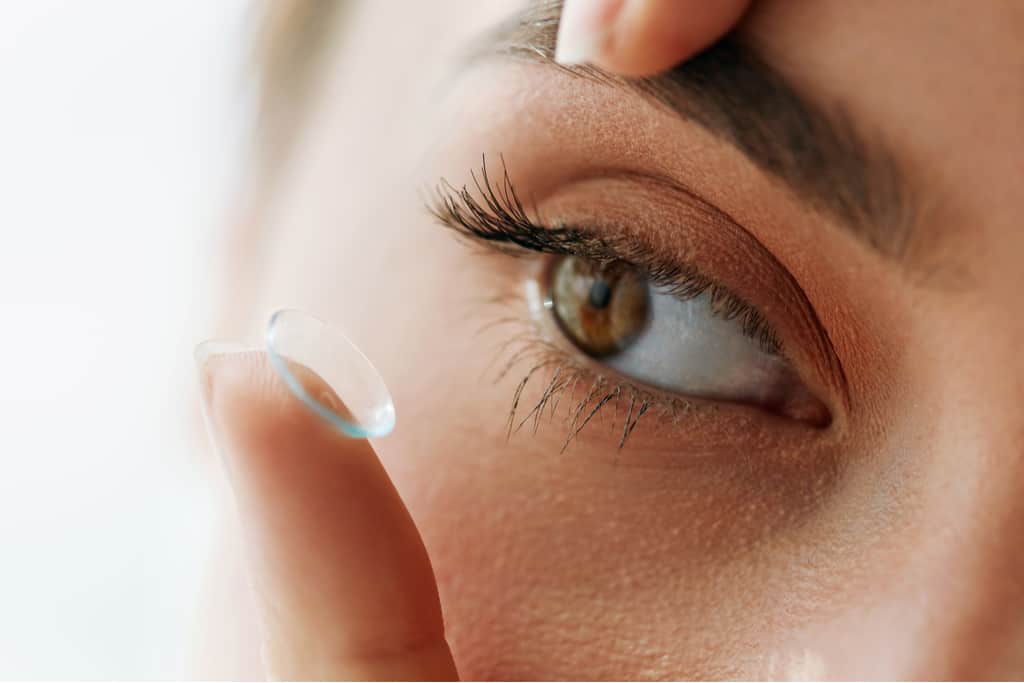Contact lens wear is very safe and safer than ever. However, most contact lens wearers may be unaware of the small risks associated with their use until they develop contact lens intolerance or corneal ulceration.
Eye Health
In the UK there are over 4 million contact lens wearers, the vast majority of which are very happy with the convenience and visual improvement lenses provide. Contact lens wear is very safe and safer than ever. However, most contact lens wearers may be unaware of the small risks associated with their use until they develop contact lens intolerance or corneal ulceration. Contact lens intolerance tends to develop with chronic wear over the years; symptoms include irritation, burning sensation, grittiness, dry eye and watery red eye. In more serious cases, corneal ulceration with potentially sight threatening infection can develop. Over a ten-year period of contact lens wear, the risk of an infection is 1 in 50 for extended wear lens wearers and 1 in 250 for daily disposable lens wearers.
It is estimated that 50% of contact lens wearers may not follow care instructions, such as daily cleaning of their lenses with appropriate solutions and even using the lenses beyond their life cycle. Many patients now buy lenses on-line without regular clinical follow-up. High-risk behaviours that predispose to infection include sleeping overnight in lenses, showering or swimming in lenses and poor hand washing prior to lens handling.
Environmental Impact
In the UK there are over 4 million contact lens wearers, the vast majority of which are very happy with the convenience and visual improvement lenses provide. Contact lens wear is very safe and safer than ever. However, most contact lens wearers may be unaware of the small risks associated with their use until they develop contact lens intolerance or corneal ulceration. Contact lens intolerance tends to develop with chronic wear over the years; symptoms include irritation, burning sensation, grittiness, dry eye and watery red eye. In more serious cases, corneal ulceration with potentially sight threatening infection can develop. Over a ten-year period of contact lens wear, the risk of an infection is 1 in 50 for extended wear lens wearers and 1 in 250 for daily disposable lens wearers.
It is estimated that 50% of contact lens wearers may not follow care instructions, such as daily cleaning of their lenses with appropriate solutions and even using the lenses beyond their life cycle. Many patients now buy lenses on-line without regular clinical follow-up. High-risk behaviours that predispose to infection include sleeping overnight in lenses, showering or swimming in lenses and poor hand washing prior to lens handling.
So what can be done? How can we make contact lens wear safer?
Contact lens wearers can reduce pollution by disposing of their lenses in a solid waste collection bin, though there is evidence that microplastics that persist anywhere in the environment can be consumed by animals and still enter the food chain.
Sight loss can be prevented by improving contact lens hygiene and handling. Lens wearers should wash their hands when handling lenses and clean the lenses as per the manufacturer’s instructions. They should remove their lenses when their eyes become uncomfortable, as this may be a symptom of dryness and epithelial micro-erosions that may lead to an ulcer. If the discomfort persists or becomes recurrent, contact lens intolerance may be developing; contact lens wear should be discontinued until review by your optometrist or ophthalmologist. Laser vision correction may be considered as an alternative, as it actually may be safer than long-term contact lens wear. To learn more about laser vision correction, visit the LASIK, Advanced Surface Ablation and SMILE pages of our website. If you suffer from short-sightedness (myopia), long-sightedness (hypermetropia), astigmatism or need reading glasses, book a free screening appointment at our Laser Vision Eye Centre website or call 02381 810001. Our consultants will discuss your suitability for laser vision correction and the best treatment option for you.







